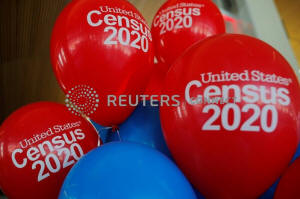|
Republican senator wants U.S. Census to
ask about criminal records
 Send a link to a friend
Send a link to a friend
 [May 23, 2019]
By Lauren Tara LaCapra [May 23, 2019]
By Lauren Tara LaCapra
(Reuters) - The U.S. census should include
questions about criminal records to help policymakers get former
convicts back into the workforce, a Republican lawmaker said on
Wednesday.
Senator Mike Lee of Utah suggested the idea at a hearing about the
economic impact of the Census. It may add a new layer to a political
battle over what questions the U.S. Census Bureau should include on its
decennial survey of U.S. residents.
"How many people are out of the labor force because of their criminal
records?" Lee asked at a hearing in Washington by the Joint Economic
Committee, which he chairs.
Finding the answer might help policymakers "identify what impact our
laws might be having on them that ... we didn't intend," he added.
Lee's suggestion was supported by testimony from American Enterprise
Institute (AEI) economist Nicholas Eberstadt, who argued that U.S.
economic statistics have a gaping hole when it comes to people with
criminal records.

Eberstadt, who wrote a book about male underemployment, noted that men
with arrest records are more likely to be unemployed than those who have
had no trouble with the law.
Although it is too late to include a question on this issue on the 2020
Census, doing so on future surveys could help the federal government
formulate policies to get ex-convicts back into the labor force,
Eberstadt said.
"It is an enormous blind spot and, given the realities of life in our
country today, a critical and inexplicable statistical oversight," he
said.
The Trump administration wants to ask respondents to next year's survey
whether they are citizens. Most Republicans support the proposal, while
Democrats, immigrant advocates and demographers oppose it, saying it
will discourage participation which could result in undercounts that in
turn could deprive some communities of funds and political
representation.
The Census determines how the federal government distributes some $900
billion in aid, as well as seats in Congress.
Harvard researchers predict the citizenship question would lead to an
undercount of more than 4 million Hispanic residents.
The citizenship question has been tied up in litigation since U.S.
Commerce Secretary Wilbur Ross first announced plans to include it in
March 2018. The Supreme Court is expected to issue a decision soon.
[to top of second column]
|

Balloons decorate an event for community activists and local
government leaders to mark the one-year-out launch of the 2020
Census efforts in Boston, Massachusetts, U.S., April 1, 2019.
REUTERS/Brian Snyder/File Photo

Adding a new question to the Census usually requires extensive
testing and consultation with lawmakers because the Census Bureau
tries to balance a desire to obtain as much useful information as
possible with the reality that fewer questions lead to better
response rates. Adding controversial questions means people are less
likely to participate.
Eberstadt also suggested asking about secular or religious
affiliation, saying this could affect how lonely or happy or
connected people feel toward their communities. A 1976 law governing
the Census prevents compelling people to disclose information about
their religious beliefs or membership.
Democrats dismissed the idea.
U.S. Representative Carolyn Maloney, a Democrat from New York who is
vice chair of the committee and active on census issues, said it is
a nonstarter.
"Proposing the citizenship question has taken us down a troubling
path," she said in a statement provided to Reuters. "The idea of
adding questions to the census on criminal history would take us
further and further away from our goal – which is 100 percent
participation in the census."
Eberstadt was one of four panelists speaking at Wednesday's hearing.
Others include Andrew Reamer, a professor at George Washington
University; Howard Fienberg, a lobbyist with the Insights
Association; and Mallory Bateman, coordinator of the State Data
Center at The University of Utah.
Other panelists emphasized the importance of Census data for
businesses and the economy. Some highlighted the risk of a
significant undercount in 2020.

"The Census Bureau's own research has shown there's a climate of
fear," said Reamer, noting that some participants in test surveys
had "run out of the room" when asked about citizenship.
(Reporting by Lauren Tara LaCapra; Editing by Sonya Hepinstall,
David Gregorio and Richard Chang)
[© 2019 Thomson Reuters. All rights
reserved.]
Copyright 2019 Reuters. All rights reserved. This material may not be published,
broadcast, rewritten or redistributed.
Thompson Reuters is solely responsible for this content. |